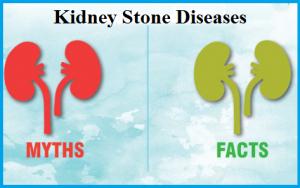Rejecting Commonly Held Myths and Clarifying Clarity on Kidney Stones
Introduction:
Kidney stones are a common ailment that affects millions of people worldwide, yet there are numerous myths and misconceptions surrounding this condition. In this blog, we aim to dispel some of the most prevalent myths about kidney stones and provide accurate information to help individuals better understand and manage this condition.
Myth: Drinking plenty of water can’t prevent kidney stones.
Fact: Adequate hydration is crucial for preventing kidney stone formation. Drinking plenty of water helps dilute urine and prevents minerals from crystallizing and forming stones. Staying well-hydrated is one of the most effective ways to reduce the risk of developing kidney stones.
Myth: Kidney stones only affect older adults.
Fact: While kidney stones are more common in adults aged 30 to 60, they can occur at any age, including childhood. Factors such as diet, genetics, and underlying medical conditions can increase the risk of kidney stones in people of all ages.
Myth: Calcium intake should be avoided to prevent kidney stones.
Fact: Calcium is an essential mineral for bone health and muscle function, and reducing calcium intake can actually increase the risk of developing certain types of kidney stones. Instead of avoiding calcium, individuals at risk of kidney stones should focus on consuming an adequate amount of calcium from food sources and talk to their healthcare provider about appropriate supplementation.
Myth: Kidney stones are always extremely painful.
Fact: While kidney stones can cause severe pain, not all stones cause symptoms. Some small stones may pass through the urinary tract unnoticed, while larger stones may cause intense pain, nausea, vomiting, and blood in the urine. The level of pain experienced can vary depending on the size, location, and shape of the stone.
Myth: Only men get kidney stones.
Fact: While kidney stones are more common in men than women, women can also develop kidney stones. The risk factors for kidney stones, such as dehydration, diet, and certain medical conditions, apply to both genders.
Myth: Once you’ve had a kidney stone, you’re destined to have more.
Fact: While having a history of kidney stones does increase the risk of recurrence, it doesn’t guarantee that you’ll develop more stones in the future. By adopting lifestyle changes such as staying hydrated, maintaining a healthy diet, and managing underlying medical conditions, you can reduce the likelihood of recurrent kidney stones.
Conclusion:
By debunking common myths and providing accurate information about kidney stones, we aim to empower individuals to take proactive steps in managing their kidney health. It’s essential to seek guidance from kidney doctor near your area, including reputable ones in Lucknow, to develop a personalized plan for preventing and managing kidney stones effectively. With proper education and awareness, individuals can make informed decisions to reduce the risk of kidney stones and maintain optimal kidney health.
READ ABOUT:- Diet and Nutrition Guide for Kidney Stone Patients

